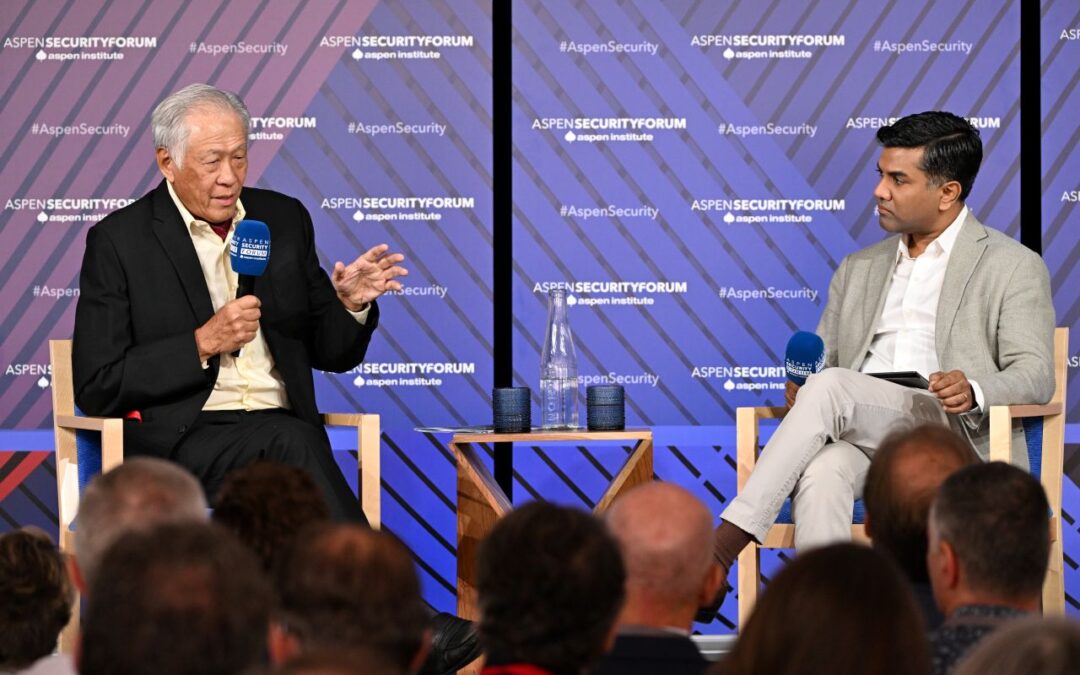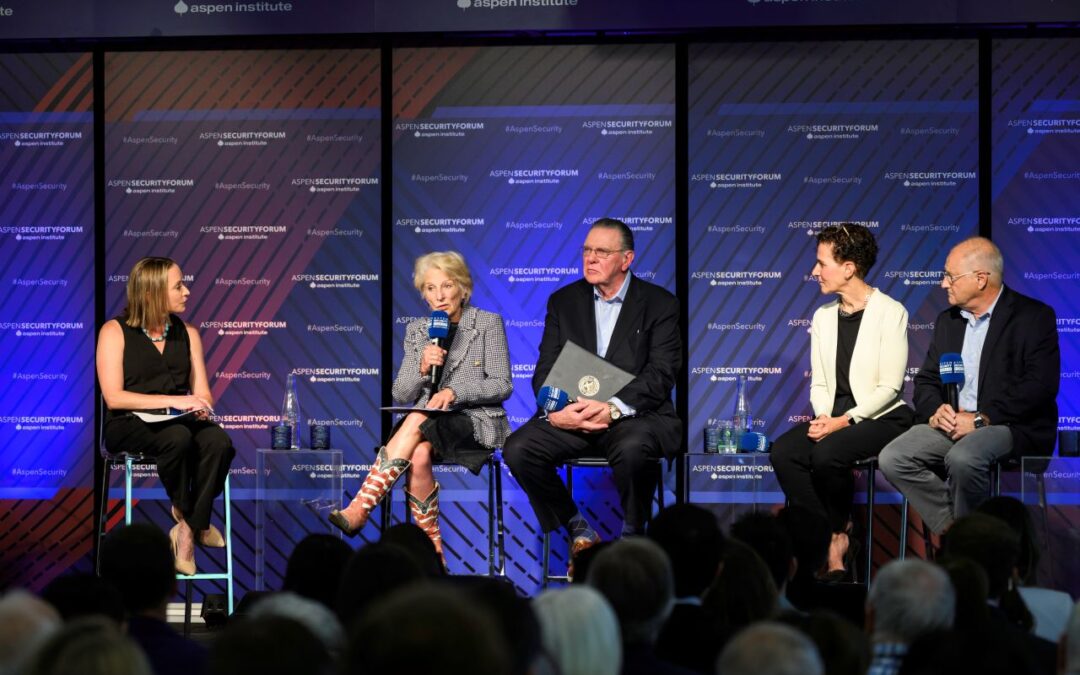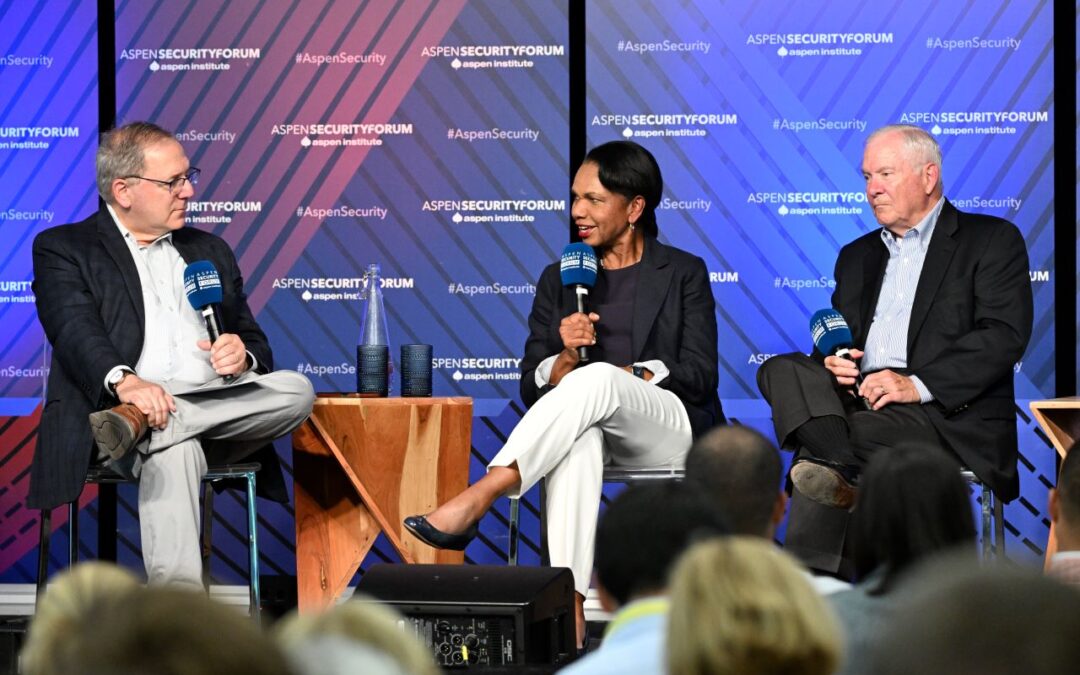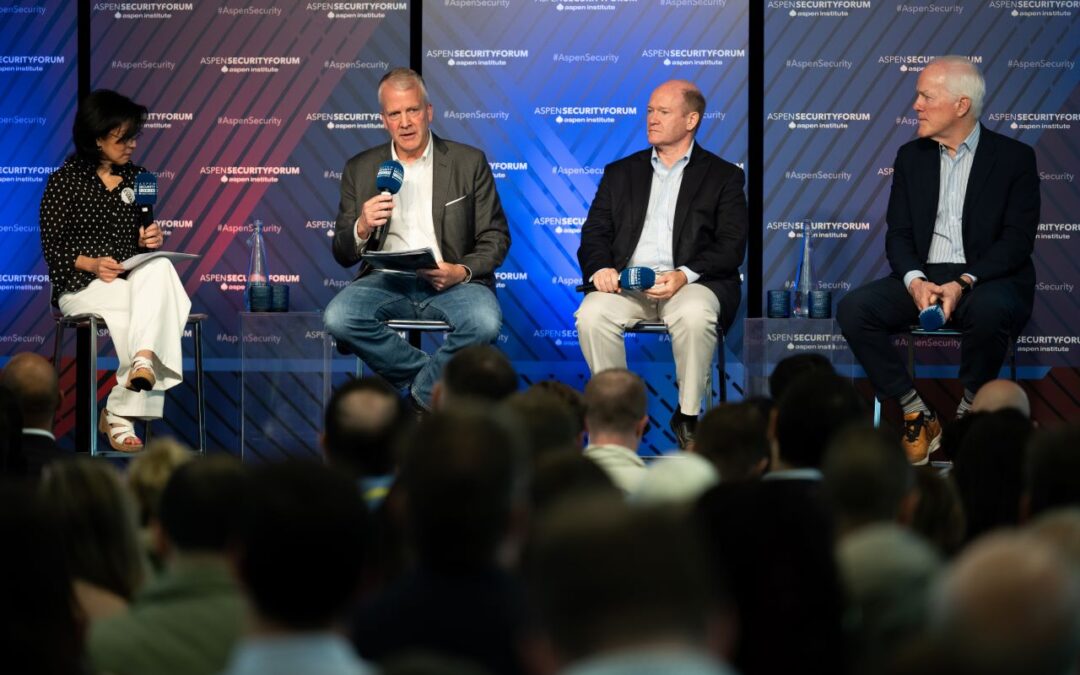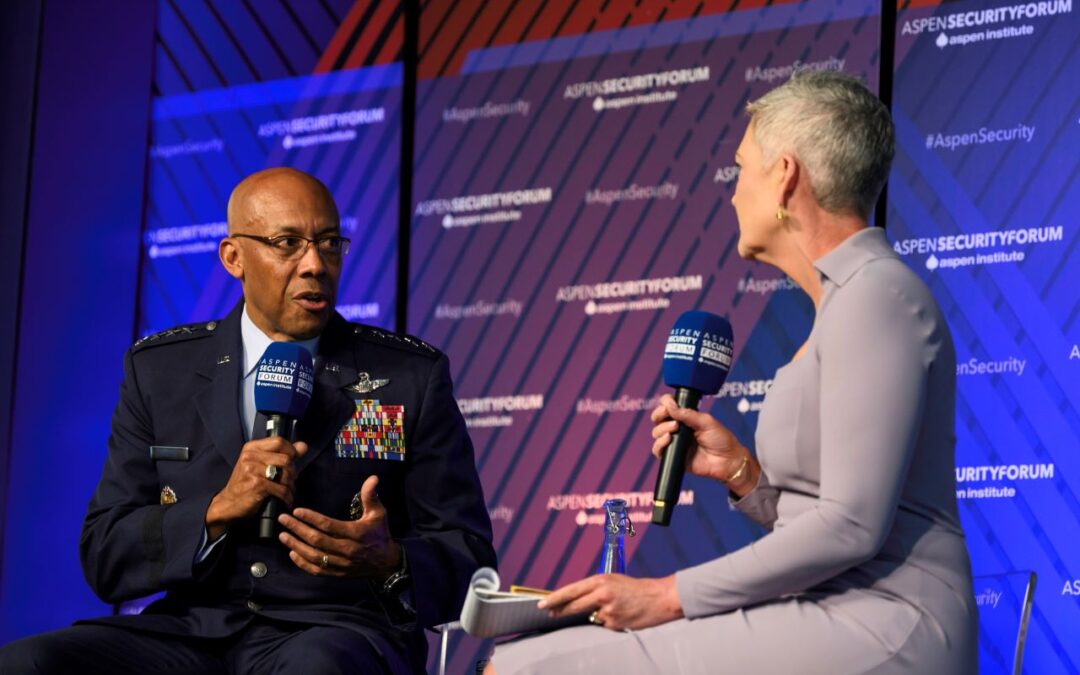Speakers
Alejandro N. Mayorkas, 7th U.S. Secretary of Homeland Security
Moderator: Fareed Zakaria, Host, Fareed Zakaria GPS, CNN
Full Transcript
Read the full transcript below or download it to your device.
Click to read the full transcript
Fareed Zakaria
Hi, everyone, welcome. This is a special opportunity with a very special guest. It’s also a particularly important opportunity and, Mr. Secretary, you will understand this. For those of you who are trying to get off TSA watch lists, come and see the secretary afterwards.
Alejandro N. Mayorkas
And away we go.
Fareed Zakaria
We talked about customer service right here are your customers and they might have some, some things to talk about. All right. Let’s start Mr. Secretary with the crisis that didn’t happen. For those of you who don’t remember under a certain health authority, title 42 I think it was called the president the administration had the ability to deport people instantly, without essentially a kind of any kind of due process because of COVID. That authority expired in May. Almost everyone was predicting there would be a massive crisis on the border 10s of 1000s of people coming every day. It didn’t happen. Why?
Alejandro N. Mayorkas
So Fareed, first of all in response to your first comment and recommend everybody registered for precheck, or Global Entry. We have seen since the end of title 42, an approximately 65% drop in the number of individuals we encounter at the southern border. And I’ll explain why but I want to take a step everyone here. Close, I’ll keep it closer. So we have seen since the end of title 42 that public health authority, May 12. We’ve seen an approximately 65% drop in the number of people encounter better southern border and I’ll explain why. I’ll explain the approach that we have taken to manage that outcome. But I want to take a step back, because I think we have to place this in context. And we have to place the level of migration we have experienced in its hemispheric and worldwide context. During World War Two there were approximately 70 million displaced people in the world. Now there are over 112 million displaced people in the world in our hemisphere is by no means exempted from that extraordinary migration, that extraordinary level of people departing their countries of origin in search for a better life. Our approach has been very, very straightforward, and it’s been really two pronged. One. We have built lawful pathways for individuals so that they do not need to take that dangerous journey to our southern border in pursuit of humanitarian relief. We have accelerated our refugee processing. We have instituted family reunification programs, we use our discretionary authority under humanitarian parole, and we are meeting people where they are. At the same time, we have sought to disincentivize people from taking that dangerous journey and we raised the evidentiary threshold that one must meet to make an asylum claim at the at the border. And that has been controversial. I must say that we find it to be compelled from a humanitarian perspective, because 15 years ago, migrants would arrive at our southern border on their own. That is not the case. Now, one must place one’s life and one’s life savings in the hands of smugglers and the level of tragedy and trauma that we observe is something that we feel compelled to avoid.
Fareed Zakaria
So the very fact that you talk about it the way you do smugglers these people making the journey into hundreds of 1000s if not millions, two and a half million people apprehended on the southern border last year, all applying for asylum. Now as I understand it, asylum was meant to be for people who faced individual persecution because they were of a certain race of a certain religion the image brought up is of course, Jews during World War Two. When you have two and a half million people coming in claiming asylum, it feels to me like it is a powerful demonstration that the asylum process is broken, that people who are ordinary economic migrants are making a rational decision to essentially game the system. So is the asylum system broken? And how do you fix it?
Alejandro N. Mayorkas
So the composition of the people whom we are encountering is a complex one. We see people who indeed are fleeing persecution, by reason of their membership in a particular social group. That is the technical definition. We see people fleeing extraordinary violence, poverty, corruption, climate change, various reasons. Economic migration does not qualify for asylum, but our system Fareed is indeed, fundamentally broken. And, you know, there is unanimity about that fact. But regrettably, we cannot seem to all agree upon a solution.
Fareed Zakaria
Let me put it bluntly. Do you think that Republicans in Congress want to solve this problem or want to keep it alive because it works very well as election politics for them?
Alejandro N. Mayorkas
Certainly, I’ve heard that opinion expressed by others. Let me I want to, you know, when we speak of gaming the system I just want to I just want everyone to understand the profile of the individuals whom we are encountering. And the President spoke of the dignity of every individual, you know, we in the Department of Homeland Security. I issued a memo very early on that we would not use the term illegal alien. When speaking of these individuals, we would we use the term non citizen and that speaks to the importance of respecting the dignity of the individual, an individual who’s a parent who’s daugher out cannot walk safely to school. And who is so desperate for a better life for that daughter, who allows that daughter to flee on her own in the hands of others, to traverse another country, only to reach the dangers of the southern border that speaks to the level of desperation. That daughter may not be fleeing persecution, by reasonable membership and a particular social group, but at the same time, she’s not gaming the system.
Fareed Zakaria
Well when I say gaming the system, I don’t blame those people. They’re making the rational decision, which is, it’s a much better idea to apply for asylum. It takes years to adjudicate you slip through the cracks, you can live in the country. Thankfully, we do not have every police state, but once you get into America, it’s very hard to track you down. So I’m not suggesting that these people are, you know, they’re doing the right thing. But my point is, in the old days, the Irish fled the potato famine, the Sicilians were fleeing gang violence, but that’s not what you know, asylum was meant to be for the kind of small number of people who were individuals. What’s the way to get back to that? Because otherwise, no matter what you do, you’re going to be talking about a number of people applying that is beyond the capacity of any government to process and you know, as you know, it’s not just America that’s facing this, the Brits are facing this the French are facing this the Spanish are facing it. And everyone we’re by the way, it’s fueling right wing populism.
Alejandro N. Mayorkas
Yes. And we’ve seen that in, in the upheaval in certain political establishments around around the world. the system has to be broken, you know, before our administration began, the average length of time between an arrival at the border and claim of credible fear that initial threshold and the ultimate adjudication of the asylum case was six years, six plus years and so and what happens well, so we, what happens is people get a job. Their children go to our schools, they may have a child, a US citizen child, and they establish roots and then it becomes very difficult to remove them. Right now what we have done is we have promulgated a regulation that seeks to collapse that six year period into under a year. And we’ve empowered our asylum officers to adjudicate those claims, and so we’re making the reforms that we we can.
Alejandro N. Mayorkas
Meanwhile, on the other end of this, which is skilled immigration, it seems to be we have a different kind of crisis. There’s a huge demand for skilled labor, we don’t seem able to set up an immigration system that finds these people to me the most remarkable statistic here’s Canada led in 250,000 skilled immigrants last year. The United States with eight times the population of Canada, letting 85,000. The way you get in as a skilled immigrant today in the United States, is you enter your name in a lottery to me there’s nothing more symbolic of how broken the system is that in order to get into the United States as a skilled immigrant, you don’t go through a meritocratic process. You don’t go through a Lea you know, a system of rules and laws and judicious judgments. About You know, you go to Vegas, you hope that you get lucky and you hit the Hard Eight. This surely I mean, surely we’ve got to fix this.
Alejandro N. Mayorkas
So the for the skilled workers, there are applications people submit their qualifications companies seek to hire them. It has a level of organization
Fareed Zakaria
And then and then you put it into a lottery.
Alejandro N. Mayorkas
And then and then you put it into a lottery. There is no question Fareed that our our immigration system is not calibrated to our economic needs. That numerical limit on skilled workers has been in existence for years and years, and Canada is able to calibrate the number of skilled workers it seeks to join according to the market needs in the country Each year and we are just so outdated.
Fareed Zakaria
And again, this would require congressional action and you just think there’s no no prospect of that.
Alejandro N. Mayorkas
I am a relentless optimist. My optimism is under great challenge.
Fareed Zakaria
And again, do you do you? I mean, you must be involved in these discussions. Is it possible to engage Republicans on this is that because on this particular issue, I assume that there is again, as you said, Not maybe not unanimity, but a sense that these are small numbers in the grand scheme of things that would make a huge impact on the US economy?Is you know, is there any prospect of a Mitch McConnell or Kevin McCarthy taking this on?
Alejandro N. Mayorkas
I can’t speak to the those individuals but I can say that there are members on both sides of the aisle that have been driving for immigration reform and continue to drive for it. It’s just a very, very challenging landscape as I think we all know.
Fareed Zakaria
And so going forward is your hope, with the with the people coming in from the southern border, because I think you will agree, this is not going to stop anytime soon. You’ve got climate change, you’ve got political instability, you have the usual mix of poverty and disease and people are going to keep coming is the idea that you will simply try to have the process work better. Do you have enough immigration judges to review this stuff so that the asylum asylum application doesn’t take six years? What’s What’s the long term short of a kind some kind of grand immigration reform? What do you hope this looks like in a few years?
Alejandro N. Mayorkas
Our hope is that our model of incentivizing people to apply for relief before they take the journey and delivering a consequence regime if they don’t avail themselves, of those pathways, works and keeps a cap, if you will, on the number of people we encounter under very dangerous circumstances. Fundamentally, we need the system to be fixed. We have a an immigration court backlog with the immigration judges of over 2 million cases.
Fareed Zakaria
Wow. All right. As if that isn’t enough, you’ve got a few other things on your plate. We spent a lot of time at for like this, talking about terrorists. We don’t talk about it that much. Has the threat diminished?
Alejandro N. Mayorkas
I would say that the threat has evolved. The our department was formed in 2003. We have one of the heroes of our department, Jane Harman here. Of course, it was born of the tragedy of 911. And our focus was on the foreign terrorist seeking to enter the United States to do us grave harm over the years 10 years later or so. 2012 13 14 It really changed. Our focus the prior threat of the foreign terrorist persistent, but we saw rise in prominence what we call the homegrown violent extremists, the individual already resident in the United States, radicalized to violence by a foreign ideology, who sought to do us grave harm. We have now seen that and that remains. We just saw the arrest of a 17 year old radicalized to violence by ISIS. So those threats persist and we keep our focus on them. But we’ve seen a rise in what we term domestic violent extremism, individuals driven to violence by an ideology of hate, we’ve seen hate a grow exponentially in this country, anti government sentiment, false narratives, personal grievances and other phenomenon really disseminated propagated on social media and other platforms.
Fareed Zakaria
The numbers suggest that so called white nationalist terrorism, at this point, vastly outnumbers Islamic terrorism or foreign inspired terrorism. Would you agree with that
Alejandro N. Mayorkas
When you when you ask that Fareed, just speaking of domestically?
Fareed Zakaria
Domestically.
Alejandro N. Mayorkas
Domestically, we see the rise of white nationalism pose a very prominent threat. I must say, it’s very important because we get involved not with respect to a response to an ideology, however odious it might be. But when there’s a connectivity to violence, that’s where our footprint is made.
Fareed Zakaria
In other words, if somebody is reading, white supremacist literature online, that is not sufficient cause?
Alejandro N. Mayorkas
That that is not where we engage, where we engage with when there’s an intent to commit a violent act. We of course, work with communities to prevent that violent attack from materializing. That is, that is what we do.
Fareed Zakaria
And in your view, is this white supremacist ideology and the militancy and the violence? Has it peaked? plateaued or still on the rise?
Alejandro N. Mayorkas
I don’t think we have the confidence to say that it has plateaued and I think, for me, there’s a very important point to be made because while we speak of it in the domestic context, it is an international phenomenon. And that’s to say that not only is this a rise and we have observed in other nations, but we see a great deal of connectivity between individuals and small groups, loosely affiliated groups of individuals, connecting with one another internationally. And it reflects what I broadly more broadly describe as a real convergence of homeland security and national security, not just with respect to domestic violent extremism, the radicalization of people to violence, but also with respect to cybersecurity, and so many other aspects of our work.
Fareed Zakaria
Let’s talk about cyber security. Do you feel in that realm, what we are witnessing is a kind of ever increasing tide of cyber attacks at critical infrastructure and other things, or is it manageable? How would you describe the state of the cyber threat to the United States?
Alejandro N. Mayorkas
I would describe it as an acute challenge and it is varied in type. We of course, have adverse Nation States, China, Russia, North Korea, Iran, that are targeting our critical infrastructure. We also have criminal actors, very sophisticated criminal actors that are using the cyber tool as a means of gaining profit.
Fareed Zakaria
Do you have any indication that the Russians are intending to interfere in the political process in our elections?
Alejandro N. Mayorkas
We are vigilantly focused on foreign interference in our elections. And the tool that is most often employed is not necessarily the manipulation of the voting booth, because we we’re working very closely with Secretaries of State around the country have built redundancies and right so that infrastructure is secure. not impervious to attack, but where we the tool of disinformation to influence individuals intentions is a is a threat stream that we’re very, very focused on.
Fareed Zakaria
There Were arrests made in Florida, of Russian agents who seem to be trying to interfere in domestic Florida elections. Is that a pattern? You see? It struck me as kind of slightly bizarre.
Alejandro N. Mayorkas
I don’t know that it’s a pattern but remember, it’s not just necessarily national elections that are within the purview of our work to make sure that our election system as a country is secure.
Jane Harman
Before I open it up to questions, I thought I’d like to have you reflect on your personal story and how it informs your work. You were one year old when your family fled Castro’s Cuba. What was it like when you got here?
Fareed Zakaria
I’ve never been that precocious. So, I will let me let me let me let me let me say, let me let me share it. Let me share a story with you because my father lost the country of his birth, lost his small business that he was very excited. About, and was not able to be by his mother’s side when she passed from cancer. It was the second time in my mother’s life, that she was a refugee. She fled a world war two very late and lost a tremendous amount of family and the really brings us back to where we started. The understanding of displacement was something that I grew up with. And it was a very profound theme in my parents teachings to my sister and to me, when I was a director of US Citizenship and Immigration Services, I visited a refugee camp in Dadaab on the Kenyan Somali border. And I could not describe these individuals as poor because poor sometimes can reflect that one Has something but not enough. And these people had nothing. They slept on the sand. The paper or plastic bags is the roof. When the sun set, it was pitch dark. The camp was designed for 90,000 people that when I visited 300,000 people were there. And I sat in on an interview of a family of six. And the refugee officers started for a questioning of the family to see whether that family could qualify to come to the United States as refugees and she asked the 17 year old daughter the first question of where were you born? And the daughter looked down, puzzled, and looked up and said, Well, I was born here. I was born here. She had known nothing else but that camp, and I came back and I have a very difficult time identifying myself as a refugee. Despite my upbringing, and the inculcation of that definition in my being. And I reflect on that, because when we promulgate policies in whatever area of our work, in our work, our mission set is so expansive, the commandant of the United States Coast Guard, Linda Fagan, the first woman commandant of the Coast Guard is here that is one of eight operational agencies and a department that is 260,000 people strong. from FEMA, to Coast Guard to Border Patrol to Secret Service, we, we cover so much. Whatever policy we promulgate is a reflection of not only who we are, but who we want to be. And that is a struggle in a very, very difficult climate. And that’s what makes it a privilege to serve.
Fareed Zakaria
Okay, opening it up to questions. Jane Harman you created this department, you like the way he’s running it?
Jane Harman
You bet I do. And I just wanted to say to you ally my Yorkers that under the most difficult circumstances and the political dysfunction of Washington, you’re doing a wonderful job. An observation and a question, the observation is that the failure of of our immigration system is not the fault of the Secretary of Homeland Security. It’s the fault of the United States Congress, which has missed every opportunity to reform the system. There was a pretty decent bill on the floor of the house during the Bush 43 administration, which I proudly voted for and which failed by about five votes, and it would have made this job manageable. I just wanted to ask about a couple of areas you didn’t touch on, because I think they matter enormously. One is the importation of fentanyl and fentanyl products, not just through the southern border, but everywhere else. I think everyone would be interested to hear what you’re doing. About that. And the other is, let’s remember 911 was an attack on on us through our air system, and TSA is part of the Homeland Security Department and what is the Transportation Security Agency doing especially since most of us went through airport hell to get here I’m not blaming it on you, but it really is hard to travel these days.
Alejandro N. Mayorkas
Well, let me start on the on the second question. airline security, I will say when when all of you think about your experience at the airport. My bet is that you think about the convenience the facility of the travel, you don’t necessarily uppermost in your mind is not necessarily the security of your flight. And that is a transformation. And it is TSA, Customs and Border Protection. Their extraordinary architecture that they have built in collaboration with the airlines are phenomenal partners in advancing our security and our partnership with other countries. And so it is a it is a very sophisticated architecture that we have that we have achieved. Jane in your first question on fenta You know, I I grew up in the federal system as a federal prosecutor. I prosecuted cocaine trafficking cases. Methamphetamine, black tar heroin. Nothing is like fentanyl in terms of its toxicity and some have used the border and as a cudgel and conflated migration and the trafficking of fentanyl because 90% Over 90% of the fentanyl comes in through ports of entry. By the way I visited the international mail facility at JFK Airport last week, and a number of small packages that we interdict, with firearms synthetic drugs it is just stunning. And we have advanced so far. The fentanyl the fentanyl problem we have 70,000 Americans died last year. It’s it is not a creation of the past 24 months. There were I think it was 58,000 deaths in 2020. This is the scourge of drugs is something that we have never overcome. We are addressing the supply side from an enforcement perspective. We are harnessing artificial intelligence to advance our capacity to interdict drugs to be able to see anomalies in passenger vehicles, commercial trucks. I will say the creativity of the smugglers is extraordinary. And yet our ingenuity in building response protocols is also extraordinary.
Fareed Zakaria
Can I just ask a quick supplementary there are two schools of thought one that China bears some responsibility for this because the source chemicals come from there. The other is that this is sort of China bashing that those chemicals could have been recalled combining two very different products. What do you think is the right way to think about it?
Alejandro N. Mayorkas
China, the precursor chemicals, many of which have legal the precursor chemicals, the pill presses that are used to manufacture fentanyl is extremely easy to manufacture. It’s extremely quick, it’s easy to conceal. We seized vertical, long vertical candles that were hollowed out with pills. China bears responsibility. We need their assistance, interdicting the chemicals and pill presses that are going in volumes that don’t reflect legitimate use.
Fareed Zakaria
I think there was another question here. Yes, ma’am.
Audience question
Thank you. Good morning. Firstly, I echo honourable Harmons comments. So thank you for your service secretary. My work is it’s not easy to solve these complex issues. And being a public servant is not easy. So thank you. Last spring in April 2022, DHS released his first ever equity action plan based on executive order 1 395 85. Since its release, I would appreciate hearing your favorite highlights since its implementation as released to equitable programming across DHS, which program has had the most progress and addressing systemic fairness under your supervision. Thank you.
Alejandro N. Mayorkas
Thank you. So the the issue of equity is a organizational priority for our department and I’ll share what I consider to be a highlight and it is a highlight born of a scathing article in a newspaper. The article was very critical of us. And by the way correctly, so what my mantra inside the organization is do not shrink from criticism just work very hard not to deserve it. But this was a criticism of us. There was a very poor black community that had been impacted by an extreme weather event. And the individuals could not access our assistance at FEMA, because they could not present adequate documentation of the ownership of their homes. They did not have the deeds of trust. They did not have mortgage documents. The like the reality. The reality was that our practices led to their disenfranchisement. These were very, very poor people. Their homes were modest, at best. And the history of that community was that these homes were passed from generation to generation. And so what we did in response to that article to achieve equity was we changed our policies and practices. We said if you do not have mortgage documents, if you do not have deeds of trust, that perhaps you have utility bills, and you can accompany the utility bills, with an attestation of ownership, and we were able to enfranchise a community that previously we have disenfranchised, that’s an example of achieving equity, when a matter is brought to our attention.
Audience question
Thank you very much for it. Stephen Shapiro with bends in the Atlantic Council. And I want to just remind you, as a secretary, we I had the pleasure of working with you on some domestic security matters some years ago, and you are a personal, if not national hero, and I want to thank you for that. Just a question for you with respect to the recent federal decision, limiting the government opportunity to interact with social media companies in an effort to stem the tide of misinformation. It seems like a major obstacle to this effort and in an already complicated world.
Alejandro N. Mayorkas
So thank you for the very kind words and it’s wonderful to see you again and I I am so sorry that I can’t comment on that case because it is actually the subject of active litigation. Let let me say this. We conduct ourselves with integrity. Homeland Security is it’s often described as a bipartisan issue. I actually consider it a non partisan because she was a political matter when we’re speaking of the safety and security of the American people. And I’m sorry, I can’t comment further. I will say this disinformation is a real threat stream.
Fareed Zakaria
Alright, somebody at the back here. I just want make sure I’m being equitable.
Audience question
Thank you. Hello again, Mr. Secretary. So if you could give one or two career advice words for the Aspen rising leaders program fellows out what would that be?
Alejandro N. Mayorkas
The most important business card that you hold is the work that leaves your desk. That’s it.
Fareed Zakaria
Well, but given that the that extraordinarily succinct and intelligent advice, you’ve also hit the time when that perfectly is the Secretary, Pleasure. to have you
Alejandro N. Mayorkas
Thank you.



